Interview: 'This is An Insane Feat': Actors Elizabeth Ayodele and Baker Mukasa on the Epic STANDING AT THE SKY'S EDGE
'It's a British story of so many different journeys intersecting, and how everyone's journey is intertwined'
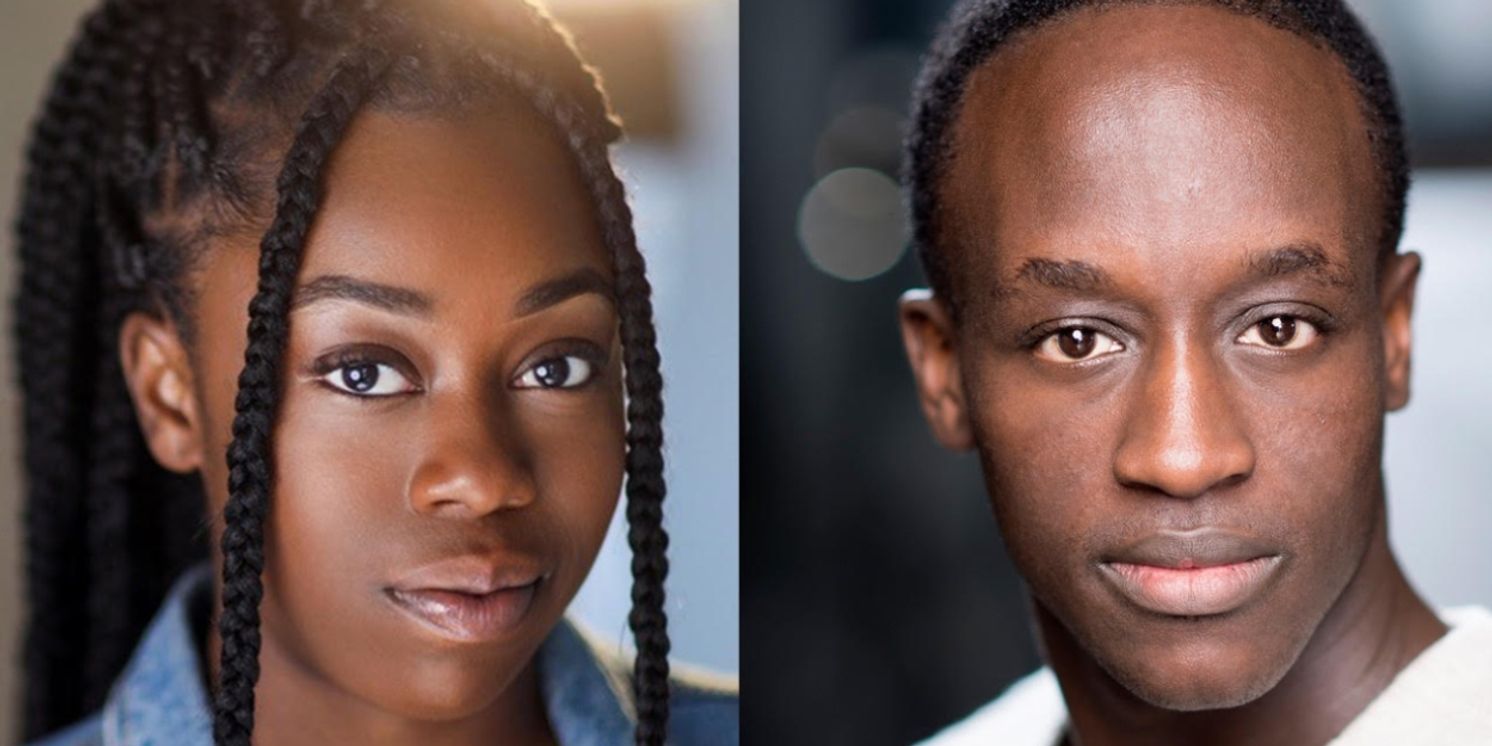
Standing at the Sky’s Edge has arrived at the Gillian Lynne Theatre on the West End after runs at the Crucible Theatre in Sheffield and The National Theatre. The show focuses on Sheffield’s famous Park Hill council housing estate, telling the story of the building and its residents over six decades.
BroadwayWorld caught up with Baker Mukasa (George) and Elizabeth Ayodele (Joy) about their roles within the show. We discussed their experiences with the show as a returning cast member (Mukasa) and a new lead (Ayodele), why they think the show is so important and what they hope audiences take away with them.
How did you first get involved in the world of theatre?
Elizabeth: I was in school. My parents were not really like, “Let's go out to the theatre.” But in school, they were doing a production of Grease... I auditioned, we did it. And afterwards, all my teachers were like, “You don’t focus anywhere else, so maybe you should do that for your job.” And I was like, “Okay, cool!” But it took me ages to figure out what it takes to actually get into theatre. I just didn't have access to any schemes or any route. There weren't any direct routes for me to get in, up until I was about, 19 or 20 and I found this organisation called Open Door who were like, “Oh, we could coach you a little bit, take you to shows and help you audition for drama schools.” And that was the way that I started getting into theatre a bit more.
Baker: I think I was similar, mainly from school - my parents weren't theatre people...My drama teacher at school was really good. She had like a connection with the Donmar, so we had loads of people from the Donmar coming in, and we'd see loads of free stuff there and at The Old Vic, but I didn't actually think of it as a job until I was about 15. I was doing it for fun because I was going to be a good African kid and become a lawyer. Then, after doing a few projects, I was like, “You know what? I enjoy doing this every day.” And a lot of teachers were like, “You're good at this, so maybe give it a go!” [Laughs] So by a lot of guardian angels who were guiding me into it, if not for which I wouldn't be doing it.
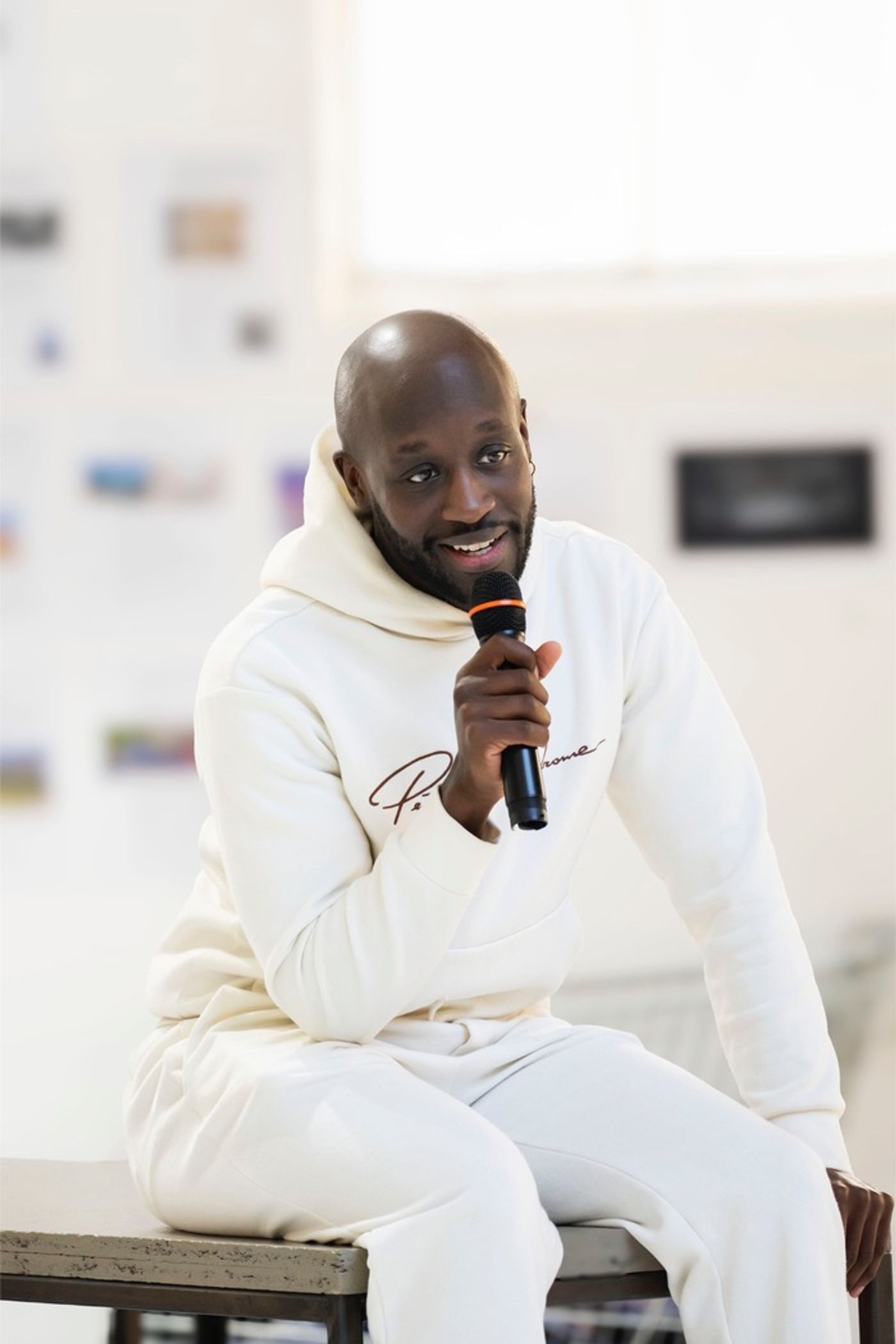
Photo Credit: Cameron Slater and Johan Persson
What made you want to be a part of this production of Standing at the Sky’s Edge?
Baker: I mean, I was lucky enough that it came around in an audition! [Laughs] To be candid, the audition comes in, and you do it! It’s only until you get to the upper echelons, where you start to really be able to pick and choose. But luckily, something like this, it's one of the few times where you read a script and you go, “Oh, God, I need to be a part of it.” So you went through the audition process and had very good agents who were able to get me in that room in the first place. So that's how it came about. So auditioned, loved the piece, and luckily got the part. Sometimes you're very lucky that a casting director has chosen you that day, and you get to be in the room and they go, “Oh, my God!” That happy marriage of, “This a part that's really for me,” and “This is something I really want to be a part of.” So that can sometimes be quite rare. So I was very lucky that those two things intersected.
Elizabeth: So true! I was gonna say the same. At first, I was being seen to play a swing. So at the time, I was just like, “I heard really good things! I didn't watch it, but I heard really good things, so I'd love to be just like chilling in the back and doing my thing and being part of this project that everyone seems to fall in love with.” So many people raved about it. You get the audition and you just go and do what you can. At the time, I was preoccupied with so many other things that I was like, “It probably won't happen.” [Laughs] I just was like, “It was nice to meet those people, wasn't it?” It's not so much of an active choice, but it's a really good gift.
Fo those unfamiliar with Standing at the Sky’s Edge, can you tell us a bit about it and the roles that your characters play?
Elizabeth: It's a story about Park Hill and it's a really beautiful script written by Chris Bush and arrangement by Tom Deering, and Richard Hawley's music. It's been described so many times as a love letter to Sheffield, but I think in its heart and its root, it's a British story of so many different journeys intersecting, and how everyone's journey is intertwined. How we all have community, and just by peeking into this one flat, we see the different versions of community. And we see different versions of people's lives and how a home can become everything. The story follows three different families and three different generations of people. I mean, 60 years is a long period of time to span a story across, but we've fit it in somehow! It's so incredible, and you believe it every single second. A few of my friends were so mesmerised by the timeline boxes, and they were like, “It works so well. It makes so much sense!” But I think the heart of it is the community and how Park Hill really, even though it was a real place and we're not telling necessary a verbatim story, we're telling real stories of that real place.
Baker: And the idea of home being a physical place, and the people you meet in that place. I think what Chris has done so beautifully is written a piece with quite a diverse group of people. Three very diverse groups, we're seeing how they have so many beautiful links between them and seeing those links develop as the piece goes on, it's a testament to Chris' immense skill. I've never stopped stressing reading this script and being like, “This is an insane feat. It's done so beautifully.”
Elizabeth: And you're thrown into different versions of the realities. You're watching the love stories, but you're also watching the family stories. So for example, our characters are cousins. And I think, particularly now with the conversations that people are having around war refugees and immigration, this British story is really pertinent because it's important to tell the stories from the different perspectives. And so for our characters being cousins, even though my character is younger, it's a massive responsibility on the cousins. And sometimes it causes strain, sometimes it causes tension. But that level of taking care of each other is something that everyone can identify with, whether or not you are a war refugee. I sense so much that George tries to take care of Joy, and I love that that is being put across as well because these people could be you! If you've ever moved house, you know what it is to start again. And so that version of starting again, even at this most heightened level of reality, is something that's universal. Our family is a nice little pocket.
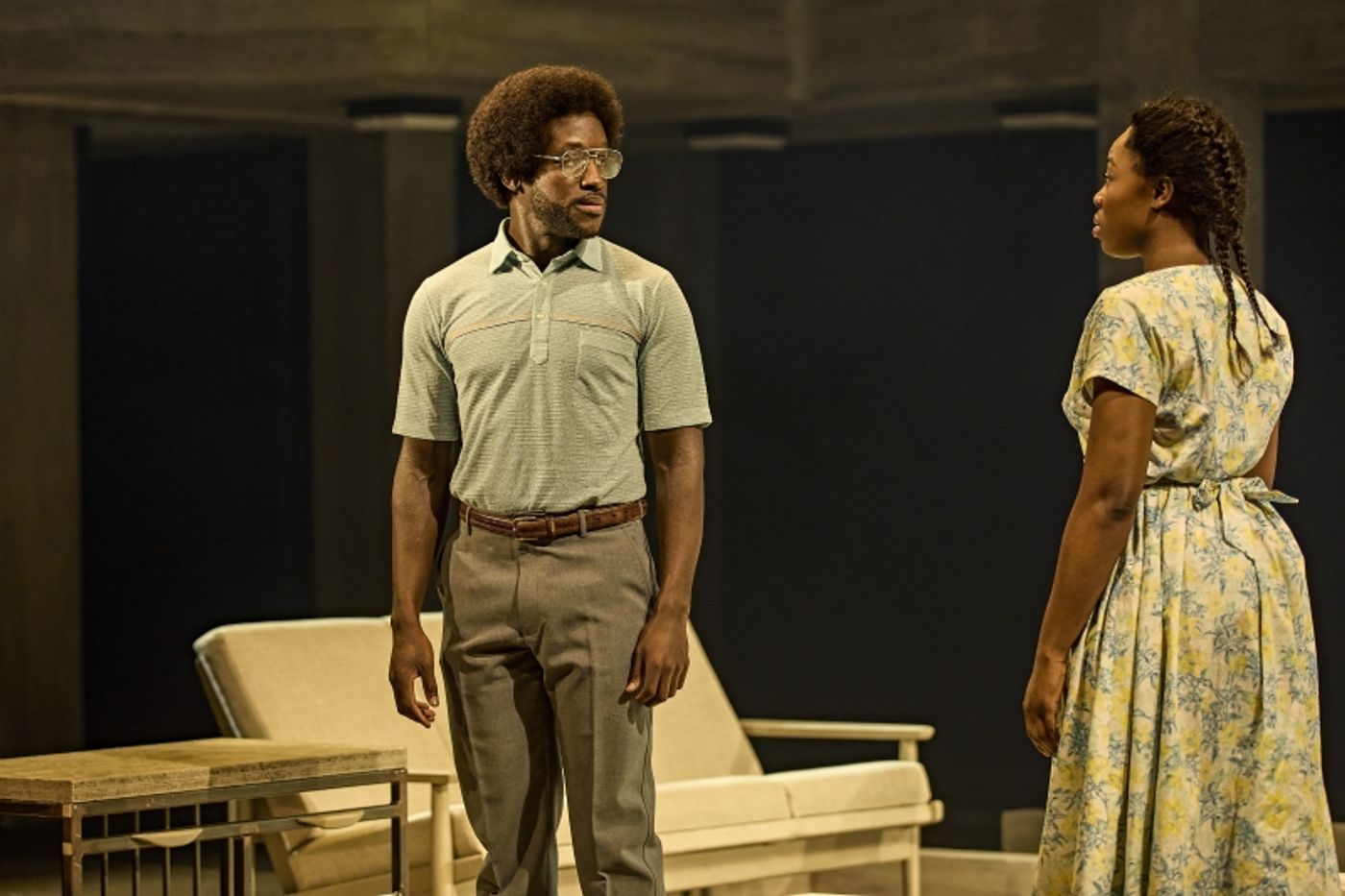
Photo credit: Brinkhoff-Moegenburg
Baker: It is a lovely little pocket! It's people who've been thrust together in such an alien environment. And then you see these people trying to straddle that tension between being community-minded in the household to their families, but also being individually-minded in terms of what they want, what their dreams are, their aspirations. And then seeing those conflicts happen in such a small space is a powder keg for a great story, but it's so reminiscent of life. My mum's Ugandan, and when I read it, I just couldn't stop thinking about her. I see so much of my mum in Joy. It just makes it really easy to play this person who's come to a new place, who needs a new beginning, and who's basically having to raise themselves, but also lean on people who weren't necessarily meant to be the parental figures in her life. And having to straddle the grief of not having your parents there, the grief of trying to come into your womanhood, not knowing who you are, all in this space where you've never been before. It's very beautiful and I really enjoy playing that space and playing the story.
What has it been like for you to be returning to the show, Baker?
Baker: It's so beautiful. When I first joined, I was in your [Elizabeth’s] position where I didn't know anything! [Laughs] And I'll never forget learning different harmonies because we learn a lot of stuff out of context, so you’d be learning lots of “oohs” and “ahhs.” You see people tearing up around you - I don't get what's happening! [Laughs]
Elizabeth: [Laughs] What’s going on?
Baker: And then you put it all together and then all of a sudden you're leaking tears and absolutely broken! This time 'round, it's like watching people read a book that you've really loved for the first time. And sometimes we'd be like, “Oh, God, I wish I can have that first-time experience again!” So it's just been so beautiful seeing other people experience it, because it's such an experience, this show! Because it's so intense learning something like this, there's certain moments you're rushing around, and then a certain moment something hits you, and everything goes still when you're like, “Oh, God!” It just shakes something in you.
So it's been really beautiful coming back and approaching things which, in my head, I've known so well. But being able to do it for new people, and then George changing in relation to the new people in the space . . . It's really exciting when you get the chance as an artist to do that and to reshape something you thought you knew really well, but actually, you're finding more nuances, because you're doing it for someone new, and they bring something else, which is really, really cool. So it's been a real privilege. It's a real privilege walking up to the theatre in the morning and seeing it all lit up. And it's a real privilege, having done it in Sheffield and having known the spirit and the heart of the show, and really been involved on that part so that we can bring it here. Privilege is the big word.
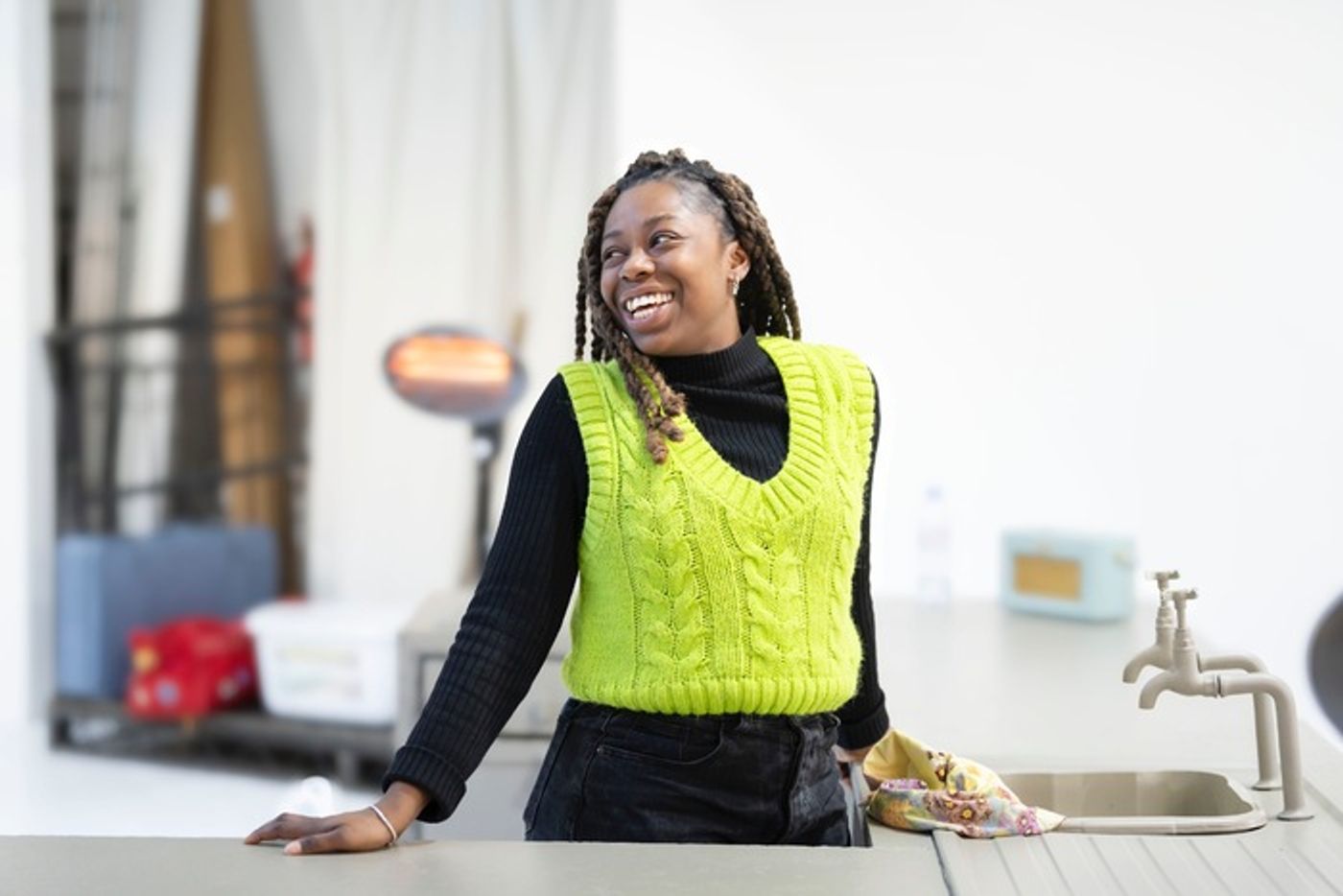
Photo Credit: Cameron Slater and Johan Persson
And what has it been like for you to experience it for the first time, Elizabeth?
Elizabeth: It’s massive! I remember the beginning when I found out, I was like, “This feels like a joke, feels like someone's pranking me!” But when you work through the overwhelming sense of, “This is a huge feat,” you come to grips with the fact that all stages and all roles are just moments... But at the heart of it, it's all on the page. Chris has written such an incredible character that I was like, “Oh, okay, the writing will do it for you.” Not to say that I don't have a job to do - I do! But the writing offers me so much that even when I get overwhelmed, I still feel like there is enough there that you don't have to put so much on top of it. It will still come to life and people will still understand this young woman because I think there is a bit of Joy in all of us...
But in particular, one thing that I think was really useful is that when I came in, everyone was so supportive and kind and graceful. I've had it before, but not very often. It lifts everything, this idea that everyone's understanding that you're holding a really great thing. From the beginning, it was clear to me that no one was taking that for granted, and that is a thing that is so powerful when you're working on the show. Everyone wants to push to give the best so that we can tell this story and do it justice. So for me, it's been quite nice, quite entertaining, a big challenge! But I like it. I like being challenged.
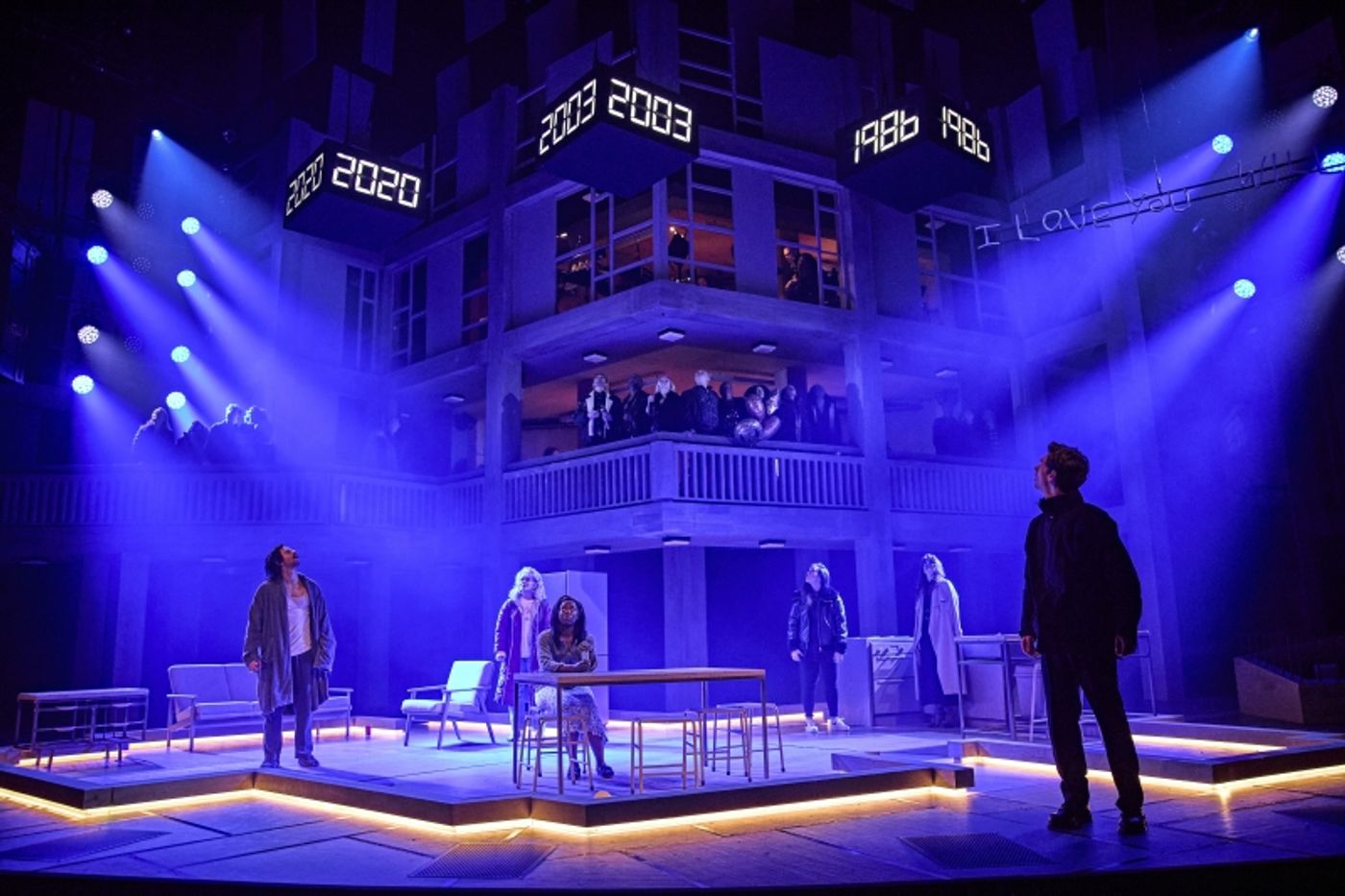
Featuring the I Love You Bridge copyright 2001 Jason Lowe.
What do you hope audiences take away from the show?
Baker: Hope, which at times feels quite cliche to say about some stuff. I think it's something that you can take for granted, the idea of hope. It is quite scary times, and you watch people going through some of the scariest moments of their life and still manage to find the strength to get up and walk again. If you take anything alone, I think it's that and the fact that there are tons of things that aren't in our power, but there are also a lot of things that are. So hopefully, take a sense of hope. A sense of pride as well, about the connections you make, about the journeys you made, about the progress you've made.
Elizabeth: I agree with you, 100%. Hope, it's such a key thing. I would hope that people can walk away and really identify with themselves in this piece because there's such a nice range of characters and it's such an ensemble-led show that people could potentially see a bit of themselves in each of us in each of the storylines and take away a deeper understanding of how similar we all usually are. And that differences are there - we shouldn't ignore them. But actually, we are linked in so many more ways than we know and we have a great sense of community if we could just open our eyes to what's going on around us.
Baker: Complex but also so simple. All these different people who look completely different, think completely differently, they all pretty much want the same thing. If you recognise that I think the world would be a much better place!
And finally, how would you describe the show in one word?
Elizabeth: Sheffield! [Laughs]
Baker: [Laughs] That's so brilliant! I think the glory of the show is that you can't sum it up in one word.
Elizabeth: Yes!
Baker: It sounds like a cop-out, but it really isn’t! It’s too multifaceted, it's too complex and devastatingly beautiful to try and make it one word, which is why it's this glorious piece. So come and encounter all the many words in all the music and come up with a word for yourself!
Read our review of Standing At The Sky's Edge here
Standing at the Sky’s Edge is currently running at the Gillian Lynne Theatre.
Powered by
|
Videos

